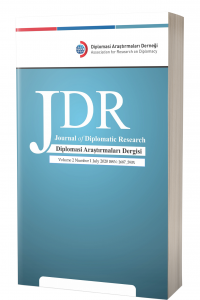EKONOMİK GÜVENLİĞİN DIŞ POLİTİKA OLUŞUMU ÜZERİNDEKİ ETKİLERİ: BRICS DEVLETLERİ ANALİZİ (2001-2018)
Güvenliğin çok boyutlu olarak analiz edilmeye başlanması, uluslararası sistemdeki aktörlerin güvenlik politikalarının da çeşitlenmesine sebep olmuştur. Bu bağlamda artan ve karmaşıklaşan ticaret, finans ve üretim ilişkileri, aktör çeşitliliği yarattığı gibi söz konusu aktörleri risk ve tehditlere de açık hale getirmiştir. Ekonomik güvenlik ve etkilerinin analizi ise diplomasi tarihi boyunca “ikincil” ya da “yan faktör” olarak gösterilen “ekonomik güç ve ögelerine” bir nevi iade-i itibardır. Bu bakımdan ulusal, bölgesel ve küresel çıkarlar ile hareket eden ve çok çeşitli perspektiften ekonomiye odaklanan uluslararası ilişkiler aktörlerin katkısı ve etkisi, güvenlikleştirilen bu süreci anlamak için elzemdir. Zira hem ekonomik küreselleşme ile birlikte uluslararası sistemin homojenleşmesi hem de devletlerin yaşadığı bağımsızlık / egemenlik açmazları söz konusu durumu daha da kritik hale getirmiştir. Bu kapsamda küreselleşen dünya ile birlikte devletlerin sürdürülebilir ve dengeli bir ekonomik büyüme ile güçlenen güvenli bir ekonomiye sahip olması, gündemin ön sıralarına yükselmiştir. Bu sebeple uluslararası ilişkilerde yeni bir perspektif için ekonomi ve güvenlik terminolojisinde disiplinler arası bir etkileşim alanı olan ekonomik güvenliğin unsurları, yapısı ve etkileri ile analiz edilmesi yerinde olacaktır. Bu bağlamda çalışmamızda yükselen ekonomiler arasında ön plana çıkan ve küresel ekonomik düzen için alternatif bir ekonomik kutup olarak değerlendirilen Brezilya, Rusya Federasyonu (RF), Hindistan, Çin Halk Cumhuriyeti (ÇHC) ve Güney Afrika’nın oluşturduğu BRICS’in uluslararası ilişkilerdeki ekonomik ve politik rekabetteki rolü analiz edilecektir. Diğer bir ifade ile çalışmanın amacı BRICS devletlerinin ekonomik güvenlik politikaları ile dış politika açılımları arasındaki bağıntı ile uluslararası sistemin hâlihazırda içinde bulunduğu ekonomi-politik çıkmazları ve rekabet alanlarını irdelemektir.
Anahtar Kelimeler:
Ekonomi, Güvenlik, Ekonomik Güvenlik, Dış Politika, BRICS, Economic, Security, Economic Security, Foreign Policy
The Effects of Economic Security on Foreign Policy Formations: Analysis of BRICS States (2001-2018)
The multidimensional analysis of security has led to the diversification of the security policies of the actors in the international system. In this context, increasing and complex trade, finance and production relations have created actor diversity and made these actors open to risks and threats. The analysis of economic security and its effects, on the other hand, is a kind of restitution to "economic power and its elements", which have been shown as "secondary" or "side factors" throughout the history of diplomacy. In this respect, the contribution and influence of international relations actors acting with national, regional and global interests and focusing on the economy from a wide variety of perspectives is essential to understand this securitized process. Because both the homogenization of the international system with economic globalization and the independence / sovereignty dilemmas experienced by the states have made the situation even more critical. In this context, with the globalizing world, states' having a secure economy that is strengthened by a sustainable and balanced economic growth has risen to the forefront of the agenda. For this reason, for a new perspective in international relations, it would be appropriate to analyze the elements, structure and effects of economic security, which is an interdisciplinary field of interaction in economics and security terminology. In this context, in our study, the BRICS, which is formed by Brazil, Russian Federation (RF), India, People's Republic of China (PRC) and South Africa, which stands out among the emerging economies and is considered as an alternative economic pole for the global economic order, is an economic and political framework in international relations. Its role in competition will be analyzed. In other words, the aim of the study is to examine the relationship between the economic security policies of the BRICS states and their foreign policy initiatives, as well as the economic-political deadlocks and competition areas of the international system.
Keywords:
Economic, Security, Economic Security, Foreign Policy,
___
- Havlik, P. (2014), “Economic Consequences of the Ukraine Conflict”, The Vienna Institute for International Economic Studies Policy Notes and Reports, Vol 14, 1-32, https://wiiw.ac.at/ economic-consequences-of-the-ukraine-conflict-dlp-3427.pdf.
- Yayın Aralığı: Yılda 2 Sayı
- Başlangıç: 2019
- Yayıncı: Diplomasi Araştırmaları Derneği
Sayıdaki Diğer Makaleler
TÜRKİYE VE SURİYE'DEKİ SİLAHLI GRUPLAR: FIRAT KALKANI OPERASYONU ÖRNEĞİ
EKONOMİK GÜVENLİĞİN DIŞ POLİTİKA OLUŞUMU ÜZERİNDEKİ ETKİLERİ: BRICS DEVLETLERİ ANALİZİ (2001-2018)
ENERJİ GÜVENLİĞİ BAĞLAMINDA RUSYA'NIN HAZAR ENERJİ POLİTİKASI
BİR MODERN DİPLOMASİ TÜRÜ OLARAK GÖÇ DİPLOMASİSİ
BÖLGELER ARASI GÜVENLİK FAALİYETLERİNDE TEORİK BİR YAKLAŞIM: YUNANİSTAN-SUUDİ ARABİSTAN İLİŞKİLERİ
